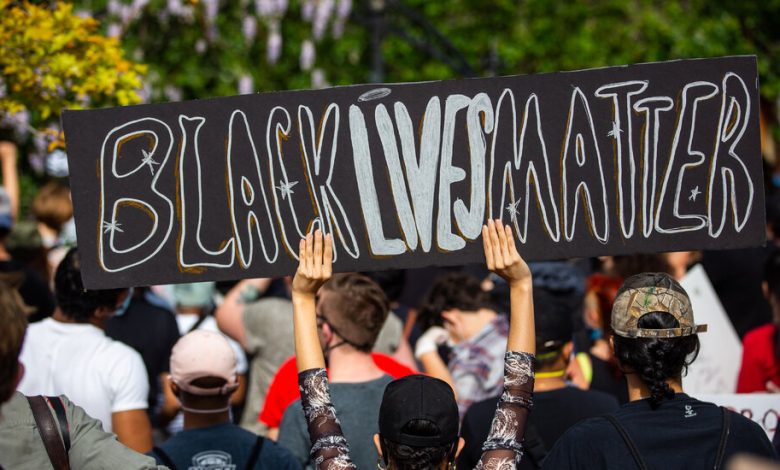Inside the College Board’s Revised African American Studies Curriculum

Reparations. Black Lives Matter. Queer studies.
These are just a few of the concepts the College Board included in a pilot of its Advanced Placement African American Studies course, but which do not appear in the final course materials, released on Wednesday. Gov. Ron DeSantis of Florida, a Republican with presidential ambitions, previously announced that he would ban the curriculum, based on a draft.
The course covers a dizzying array of topics, from early West African empires to the trans-Atlantic slave trade, the Great Migration and Afrofuturism. But a comparison between a February 2022 draft of the framework and the final version shows that many of the revisions concern the final and most contemporary of the course’s four units, titled “Movements and Debates.”
Trevor Packer, who leads the Advanced Placement program for the College Board, said the revisions were made not because of political pressure, but after receiving feedback from teachers and college professors. They were concerned that the pilot course was weighted too heavily toward contemporary theorists, he said, and not focused enough on foundational history, such as the ancient Nubian civilization.
Here are some of the changes, as well as a review of how the new course differs from standard treatments of Black history in American high schools.
Scholarly Concepts
The February 2022 draft highlighted a number of scholarly concepts that have been targeted by conservative activists. Those include intersectionality, the idea first laid out by the prominent legal scholar Kimberlé W. Crenshaw that race, class, gender, sexuality and other identities overlap and shape individuals’ experiences of the world; womanism, a movement centered around recognizing the Black, female experience; and queer studies.
Many of those terms have been removed.
In the current version, “intersectionality” is mentioned only once, as an example of a topic for an optional final project. The College Board is emphasizing the importance of these projects, which are intended to take up three weeks of class time and will count for 20 percent of a student’s final A.P. score.
More on U.S. Schools and Education
- Heavy Losses: A new global analysis suggests that children experienced learning deficits during the Covid-19 pandemic that amounted to about one-third of a school year’s worth of knowledge and skills.
- Police in Schools: Footage of a student’s violent arrest by a school resource officer has raised questions about the role of armed officers on campuses.
- Transgender Youth: Educators are facing new tensions over whether they should tell parents when students change their name, pronouns or gender expression at school.
- In Florida: The state will not allow a new Advanced Placement course on African American studies to be offered in its high schools, citing examples of what it calls “woke indoctrination.”
In a written statement, the College Board said that given the course’s structure, teachers and students would have latitude to make the class their own.
“Any scholars in the field of African American Studies are appropriate for study in this course — no thought is too daring, no idea too contentious,” it said. “We would regret if a state regulates or blocks students from such projects or any secondary source material of their individual and academically free choice.”
Still, Professor Crenshaw’s name does not appear in the final framework. She is also a key thinker in the field of critical race theory, which posits that racism is embedded in the structure of the American legal system. While C.R.T. is seldom explicitly taught outside of universities, the term itself has become an object of fixation for many conservatives, who object to K-12 schools emphasizing racism and other forms of discrimination.
Neither version of the A.P. African American Studies curriculum mentioned critical race theory.
Bringing graduate-level concepts into high schools can prove politically dicey even in progressive contexts. When the State of California released a draft ethnic studies curriculum in 2019 that focused largely on the four groups considered part of university ethnic studies departments — African Americans, Latinos, Asian Americans and Native Americans — there was outrage from some organizations representing American Jews, Hindus and other minority groups. The state chose to revise the document.
But Advanced Placement differs from other high school programs in that it is explicitly designed to expose students to college-level concepts.
Women and Feminism
A unit on “The Black Feminist Movement and Womanism,” which previously highlighted intersectionality, has been renamed “Black Women and Movements in the 20th Century.” While the term “intersectionality” is now avoided, a similar concept remains under the heading “Overlapping Dimensions of Black Life.” The new framework discusses Gwendolyn Brooks and Mari Evans as writers whose work explored gender and class alongside race. And the Combahee River Collective, a key Black second-wave feminist group, remains in the framework.
Still, groundbreaking Black female writers and leftist activists such as bell hooks, Audre Lorde, Angela Davis and Alice Walker, who were included in the 2022 draft, have since been excised.
Mr. Packer of the College Board noted that the work of less controversial African American Studies scholars, such as Evelyn Brooks Higginbotham and Henry Louis Gates Jr., had also been left out of the final framework, because of the decision to move the course away from prescribing present-day secondary sources.
Black Lives Matter and Criminal Justice
An entire unit on “the origins, mission and global influence of the Black Lives Matter movement and the Movement for Black Lives” has been deleted from the 2022 framework. The term Black Lives Matter does not appear in the current version of the curriculum.
Last year’s draft also included a unit on “incarceration and abolition,” which was heavily influenced by the work of Michelle Alexander, author of “The New Jim Crow.” Ms. Alexander is a writer and civil rights activist known for her argument that modern-day mass incarceration is, in some respects, an extension of the systems of control established under slavery and segregation.
Ms. Alexander and her ideas, which are divisive even among some left-leaning scholars, have been removed from the final version of the course. The revised framework does suggest “crime, criminal justice and incarceration” as optional project topics.
L.G.B.T.Q. Topics
“Black Queer Studies” was a focus in the 2022 draft, and it mentioned three leading scholars: Cathy Cohen, a University of Chicago political scientist and expert on race, gender and sexuality; Roderick Ferguson, a professor at Yale University who has written about gay rights through the lens of race and class; and E. Patrick Johnson, founder and director of the Black Arts Initiative at Northwestern University.
The term “queer studies” and those individual names have been deleted from the current version of the curriculum. The new framework does make a passing reference to the midcentury civil rights leader Bayard Rustin facing discrimination because he was gay. It briefly discusses Black lesbians feeling out of place in both the civil rights and women’s movements, which were led by Black male and white female figures.
Reparations
Arguments in favor of reparations for slavery were highlighted in last year’s draft. It cited H.R. 40, a congressional bill to study reparations, and the work of Ta-Nehisi Coates, the journalist and author who in 2014 published “The Case for Reparations,” a groundbreaking essay in The Atlantic. That piece focused on the living legacies of sharecropping, redlining and other forms of economic discrimination against Black Americans.
But the term “reparations” appears only once in the final version of the curriculum, as an example of an optional project topic. Mr. Coates’s name does not appear.
The A.P. Course vs. Current K-12 Curriculums
The syllabus also represents, in many ways, a leap forward from the current state of Black history in the K-12 classroom. Many states do not require schools to teach about redlining or discrimination against African American veterans in the administration of federal benefits through the G.I. Bill, both of which are emphasized in the A.P. course. Few standard high school history textbooks go into any detail on thinkers like Marcus Garvey, who the College Board highlights in a unit on Black Internationalism.
The College Board also calls attention to Black resistance to slavery and discrimination, including a new section on Black women’s tactics for fighting back against rape and sexual exploitation under slavery. Critics of the American curriculum have long complained that African American history is taught primarily as a series of tragedies and victimizations, with stories of Black courage, organization and strength elided.
Examples of Black achievement are often restricted to civil rights leaders like Rosa Parks and Harlem Renaissance figures like Langston Hughes. The A.P. syllabus, in contrast, highlights figures like the musician and actor Janelle Monáe, the early heart surgeon Daniel Hale Williams, and Kizzmekia Corbett, who helped lead the development of the Moderna Covid-19 vaccine.



